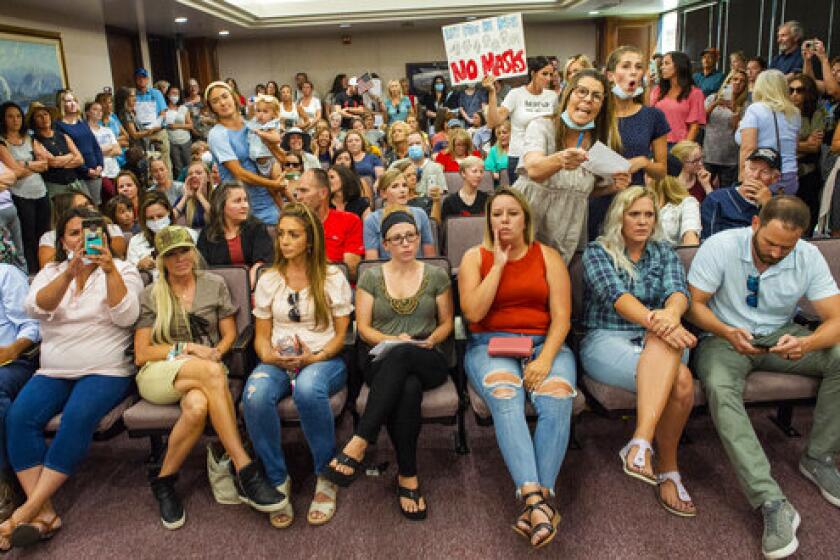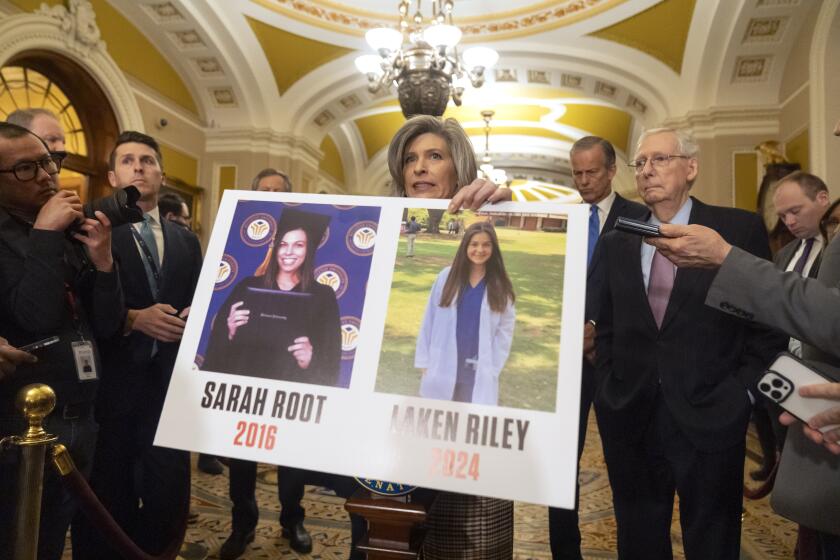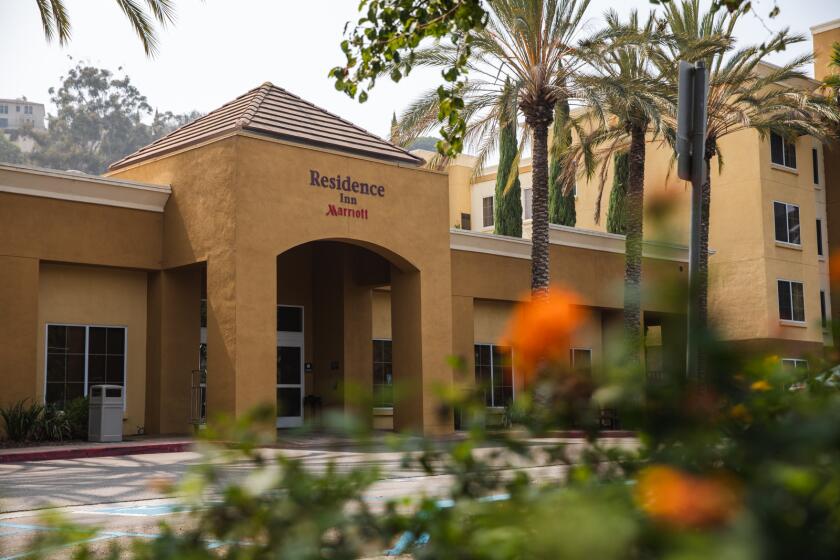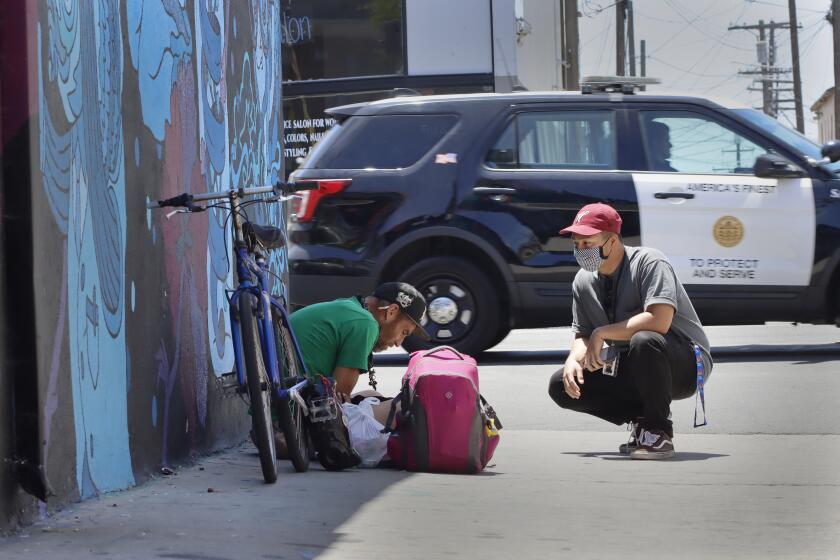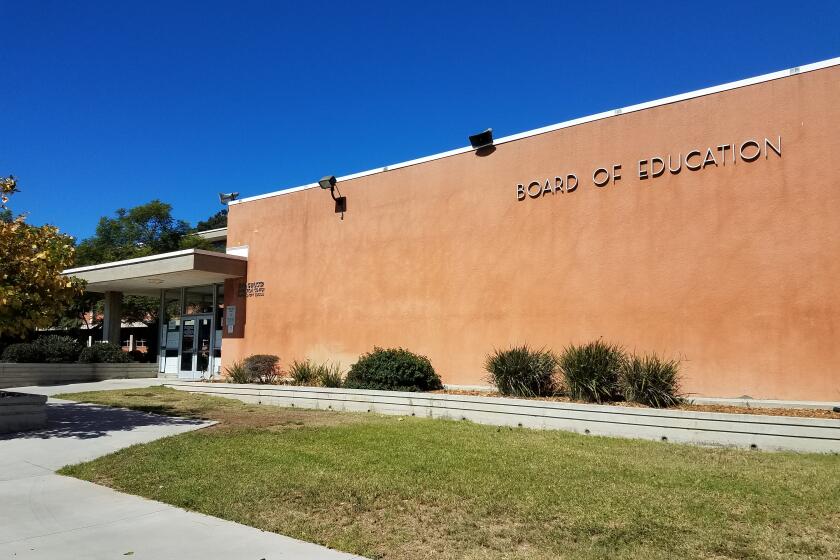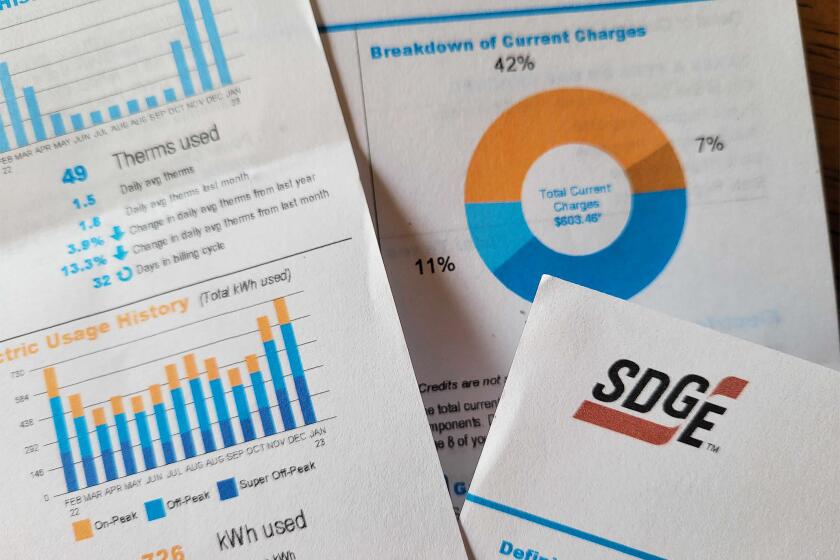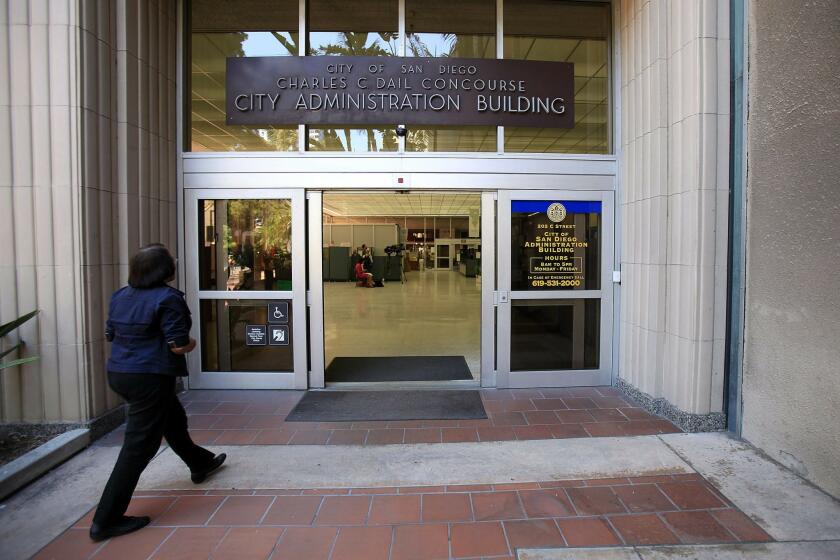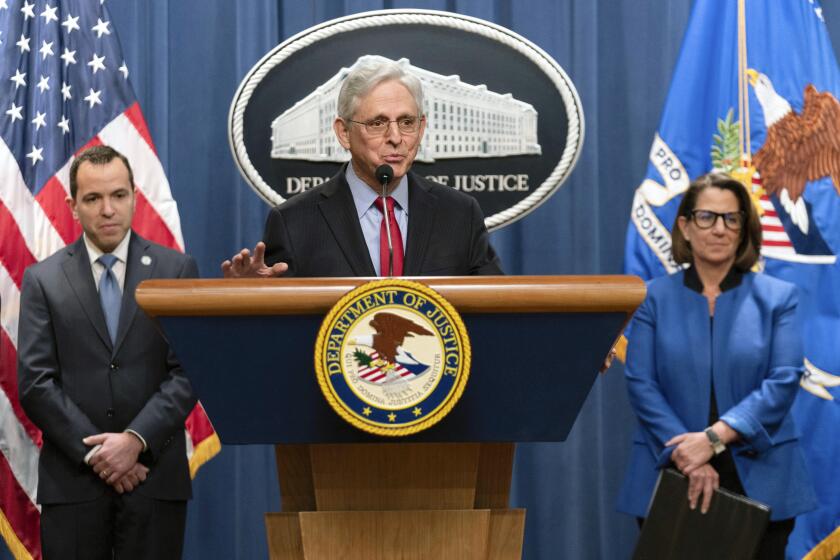Opinion: Your Say on making meetings safe and effective - Part II
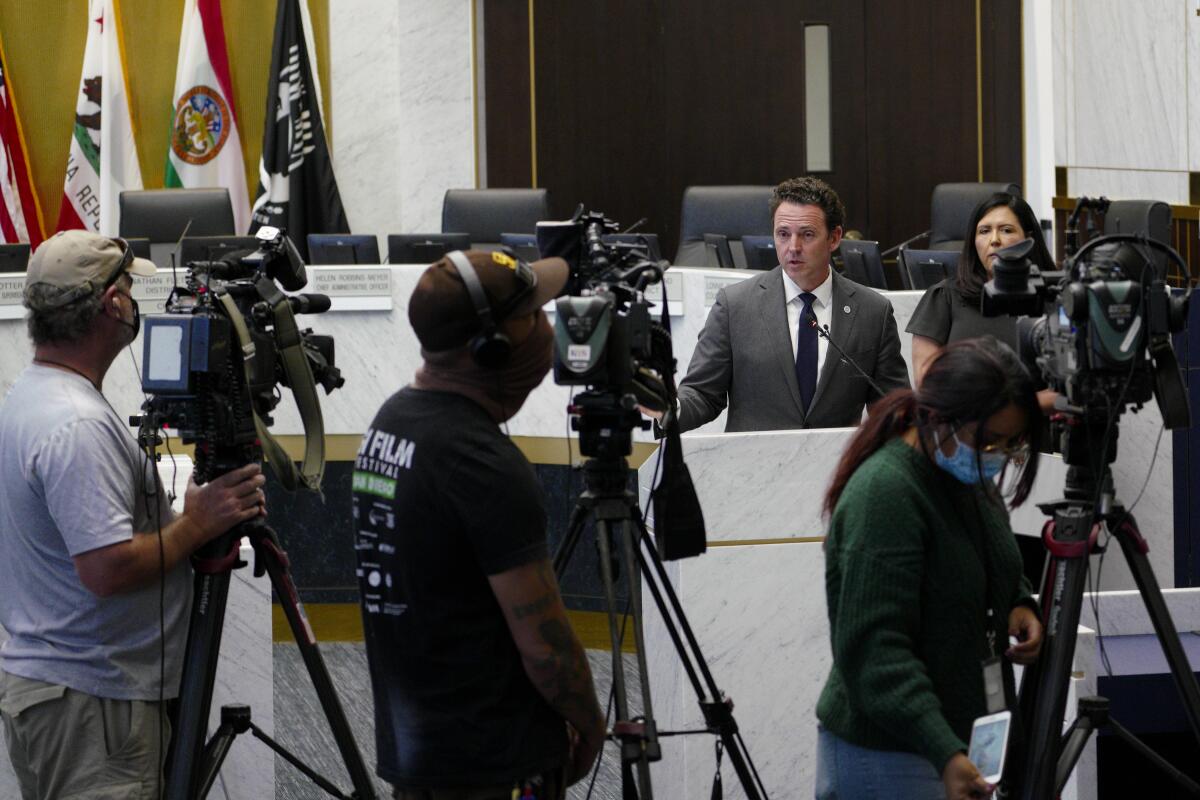
Given recent aggressive and threatening behavior at public meetings, what can or should be done to balance the need for access, free speech and transparency with the needs of elected officials to serve safely and effectively?
Civil discourse leads to better governance
“You’re a vaccination murderer.” This was one of many personal attacks aimed recently at San Diego County supervisors as they discussed COVID-19 pandemic concerns. Incidents of public behavior marked by aggressive and threatening speech have become so common that the U-T is dedicating this space to reader comments on how to address the vexing problem of not suppressing speech while also creating an environment for effective governing. The League of Women Voters believes the key to effective public participation and governing lies in an understanding of and a respect for civil discourse, the linchpin of any healthy democracy.
As the second holiday season of the COVID-19 pandemic begins in the U.S., what are you most thankful for and what do you hope to see happen in the coming year for you, your family or your community?
What can or should be done to balance the need for access, free speech and transparency with the needs of elected officials to serve safely and effectively?
For 100 years, the League of Women Voters has fostered public participation in civic matters. Indeed, the League’s vision is a democracy in which everyone has the desire, the right, the knowledge and the confidence to participate in public life. We celebrate the surge of people attending meetings, yet lament the uncivil discourse occurring with alarming frequency and intensity.
The Board of Supervisors and other local jurisdictions have policies in place for public participation. We support regular review of those policies to ensure public officials can govern safely and effectively. However, more can be done. We believe that a lack of understanding of civil discourse and its importance has contributed to the escalating vitriol. Governing bodies, in partnership with all sectors of the community, can initiate education and outreach efforts on civil discourse, explaining its benefits, the obstacles to maintaining it and its importance in effective governance. Agencies could distribute a “Guide to Civil Discourse” at public meetings and on agency websites. Speakers at public meetings might be asked to acknowledge the code of conduct and the expectation of civility.
Studies that show that, when observed, civil discourse promotes informed discussion essential for good decision-making. People are more likely to feel empowered and accept decisions as fairer and more legitimate when they are the product of civil discourse. In contrast, uncivil discourse, especially hate speech directed at elected officials, often seems intended to intimidate rather than to inform or persuade. A lack of civil discourse leads to a lack of trust and impairs the effective functioning of our civic institutions, causing gridlock and polarization.
To be sure, the League of Women Voters understands that passion and politics often go together. We recognize the role of civil disobedience in advancing just causes, and we have fiercely protected people’s right to get into “good trouble.” We understand that speech is protected even when it is rude, hateful or offensive. But citizens, elected officials and staff should feel respected and safe when conducting the people’s business. We know that when we engage in civil discourse — when we are respectful, courteous, honest and open-minded — especially in the face of controversial issues, we are better for it, our institutions are better for it, and our nation is better for it.
Karen Sutton, president, League of Women Voters of North County San Diego and Kim Knox, president, League of Women Voters of San Diego.
Free speech must be allowed, up to a point
I think the default should be that people can say what they wish. If a speaker wants to emphasize something with an expletive, that should be allowed. Calling elected officials nasty names should be allowed too, though discouraged.
If all speakers get the same amount of time, then that’s equity; nobody should be allowed to go over time or interfere with another speaker’s time. After one warning, disruptive folks should be ejected from the meeting.
Any threatening language should result in immediate ejection. Not only that, but isn’t making verbal threats itself a misdemeanor? Anyone making threats in a public meeting should be subject to arrest.
Michael-Leonard Creditor, Clairemont
First Amendment is first for good reason
Everyone has an opinion, and the ability to express it — unfounded or not — is the foundation of democracy. It was the founding fathers’ first right in the Bill of Rights. To suppress it because of a few extremist comments makes martyrs of those who caused the restrictions of rights to speech, and makes them winners in democracy’s downfall.
The answer: Respond with logic and facts (not generalities) to discredit those who provide the divisive misinformation (which all too often fills the evening news broadcasts, because it “sells”). The ideal would be to criminally prosecute those who cross the line, and there are several TV shows that could succeed in less than an hour. However, the reality of the criminal justice system is it is understaffed and has higher priorities — and how does one prosecute the social media author who resides in Georgia (or the one in Russia)?
Clifford Weiler, Mission Hills
Spewing racist hatred is not ‘free speech’
Two words pop into my mind when I read your question. They are respect and civility. There is a simple solution to the current wave of profanity-laden tirades occurring on airlines, in commercial stores and in a variety of government meetings all over this country at present. It is disgusting to witness and degrading to those at whom it is directed.
The term “free speech” does not give anyone the right to spew hatred, racism, sexism or any other degrading words directed at innocent people, government officials or business employees, just as the word “fire” is not an acceptable term to be used in a movie theater or other crowded public place. Profanity, racism and sexism are all derogatory and do not belong in public discourse, especially in settings where ordinary people are serving the public across the spectrum, from retail stores to government institutions.
In the case of the recent tirade directed at the San Diego County Board of Supervisors, shown on major news channels, nothing is going to change until some kind of action occurs to stop it. The minute a member of the public digresses into a pit of vulgarity and possible violence, as in the case of the public speakers toward the Board of Supervisors, the gavel should be dropped and the offending person escorted quickly from the meeting and barred from ever returning! If they want to be respected, they will need to demand respect. Demanding respect simply means anytime anyone digresses from civil, polite discourse, immediate removal is necessary, much as an adult will send unruly children to their room until they can be civil and polite. In no time at all, the message will resound loud and clear! We will not tolerate this kind of behavior in public, on airplanes, in business establishments, or anywhere in public.
Because behavior by a few in this country has degenerated to the present level of discourse, it will require force. Many bars are known to have “bouncers” to eject those who became unruly. At this point, since respect has been allowed to sink to an all-time low, it will be necessary to have two to three “bouncers,” deputies, sheriff’s officers, whoever is appropriate to enforce this new level of demand for respect and civility. It will be difficult to regain control, but we owe our public servants whatever effort it requires to reestablish those two concepts, or our democracy as we know it will be lost forever.
Carol Dunbar, Allied Gardens
We have the perfect storm for incivility
Why are so many good people suddenly acting so badly? Solid citizens can become dangerous thugs when misled by misinformation, emboldened by mob support, liberated by an atmosphere of impunity and justified by the false belief that their cause is righteous.
Locally, we’ve suffered systematic bullying campaigns aimed at terrorizing school boards and city council meetings. Nationally, vigilante mobs have threatened life, limb and democracy — think the January 6 insurrection: mob violence, murders and mayhem.
Why now? We suffer from a toxic brew of rampant conspiracy theories, inflamed by cynical politicians and spread by internet contagion. A sizable minority of our population have been brainwashed into believing some really absurd things such as QAnon plots, vaccines are more dangerous than viruses, the 2020 election was rigged and that learning American history will poison our kids’ minds.
There’s no easy path back to maturity, common sense and civility, but there are ways to contain the darker forces of human nature:
1) Mob behavior flourishes when there’s a vacuum of order. Responsible leaders and members of the community must organize a pushback that marginalizes the worst actors, unequivocally condemns all threats and disruptions, and supports the safety, freedom and integrity of our city councils and school systems.
2) Rules demanding orderly and civil meeting behavior must be well-publicized in advance, explicit, fair, transparent and enforced promptly and consistently.
3) There must be community consensus that “free speech” does not protect physical threats, emotional abuse, racial slurs, gay baiting and vile, inciting language.
4) When bad behavior can’t be contained by any other means, security arrangements should be in place to restore order.
5) The number of disruptors in any community is small, but they have outsize influence because they are ruthless, well-organized and often have outside assistance. Known troublemakers should be excluded from meetings.
6) We must contain and counteract the noxious and malicious spread of misinformation via social media.
The vast majority of people want to do the right thing. We, the responsible community members, mustn’t surrender the field to the few bad actors, must outnumber hecklers at school board and city council meetings, must continue to run for office despite bullying and must model courage and civility for our kids.
Allen Frances, Coronado
Don’t punish all of us just for one bad apple
The recent Board of Supervisor’s meeting resulting in unruly behavior and remarks by one public speaker is sparking Chair Nathan Fletcher to enact changes in how all comments from the public are handled after intimating that such behavior is a recurring problem.
It is not, it was an isolated incident and should be treated as such by dealing with that individual instead of changing the rules for everyone else.
I liken it to banning alcohol on city beaches because a few individuals got drunk and out of control. Punishing the masses for the actions of a few is not the answer. Fletcher needs to rethink his position on this issue and deal with the exceptions if they occur.
Fred J. Heske, Alpine
Outbursts render our meetings ineffective
Speaking to a governing body has long been an American tradition, facilitated by civil discourse, with the goal of providing information to allow the government to rule consistent with public desire. We all know that free speech, another American tradition, is not absolute. Restrictions to free speech include the “harm principle,” in which expression causes harm to others, and the “offense principle,” in which expression is deemed offensive to society. To some extent, both of these principles apply, but there is also the damage to efficiency, as a lack of civil discourse prevents meetings from proceeding.
The reports of completely unhelpful, misogynistic, racist, angry rants in various public meetings have been deeply disturbing on several levels. It is disturbing that those passionate citizens don’t seem to have an appropriate place to air their rage. The solicitation for public statement and participation is not an invitation to vent an individual’s frustration with the pandemic, partisan politics or board members. A public statement is designed to provide information to the governing body. Similarly, comments directed at board members are not acceptable. It is a business meeting; it is not the place for rage or personal assaults.
Besides being outrageous and offensive, this behavior is limiting the effectiveness of government. These unhelpful rants are entirely ineffective towards the goal of providing productive input and perhaps influencing the board on a topic. If a message is delivered with rage, the only message heard tends to be rage, and rage is generally not persuasive. The passion of other attendees sometimes evolves into disruptions or interruptions of the speaker. This again limits the effectiveness of content because the speaker cannot finish their point due to time limits. We need to change the way the meetings are conducted to allow things to actually be accomplished.
In public meetings, restricting speech must be specific and applied evenly, with clearly stated limitations and consequences. We need to better communicate and educate on appropriate language and behavior in public meetings. Perhaps this can be accomplished with required online training for speakers/attendees noting specific acceptable and unacceptable behaviors. This training needs to define content versus emotional outburst. Given occasional raucous attendees, we could limit the gallery to five people and allow other attendees to wait in the hall. Finally, a shorter time may encourage both speakers and attendees to focus on content rather than delivery. If, despite all these precautions guidelines are violated, the microphone should be muted, and the speaker removed and prohibited from speaking at other public meetings. To ensure transparency and protect these restrictions from abuse, video recordings and transcripts should be readily available.
We all want the government to listen to what we say and how we act. We must make changes to protect our right to provide information to governing bodies to affect outcomes, protect employees from harm, allow meetings to progress to conclusion and ensure that consequences are consistently applied.
Robin Weaver, North Clairemont
Hold speakers to a promise of civility
Perhaps all attendees should pass through a metal detector in order to attend the meeting. The attendees should also sign an attestation to refrain from vulgar, racist, profane or sexist remarks before they are given an opportunity to speak.
When all else fails, use a 30-second delay like what is used on TV or radio to silence the offenders.
Scott Blumen, Mission Valley
The rules we learned as kids should apply
Public meetings are for the benefit of persons who wish to hear first hand what our elected officials have to say on certain subjects, and to offer their suggestions and opinions. This doesn’t mean that those in attendance have the right to interrupt the speakers, cause a riot or act in an undisciplined manner. Adults should act responsibly and speak politely whether or not they agree with what has been said.
When children attend school they’re taught to wait their turn. Why do they behave differently when they become adults? When at a public meeting, the official in charge should announce when the floor is open to public comment. Persons wishing to express their thoughts should raise their hand and wait to be called upon. Yes, just like in elementary school. If they want their comments to be heard and taken seriously, they should speak coherently and politely. Few will want to listen to foul language or witness threatening behavior.
In order to make public meetings safe and effective, there must be an element of discipline. Rules should be posted. When a spectator speaks out of turn or acts aggressively, the police officer or other law enforcement person on duty should remove that person from the room. If this happens often enough, perhaps it will set a precedent and people will think before using aggressive or threatening behavior at a public meeting or elsewhere.
Iris Price, Ramona
Get Essential San Diego, weekday mornings
Get top headlines from the Union-Tribune in your inbox weekday mornings, including top news, local, sports, business, entertainment and opinion.
You may occasionally receive promotional content from the San Diego Union-Tribune.

